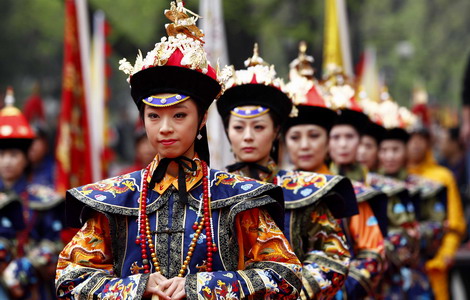|
 |
|
Women in ancient attire perform the ceremony to offer sacrifice to the Goddess of Silkworms at the Altar to the Goddess of Silkworms in Beihai Park, Beijing, on Thursday. [Photo / China News Service] |
Federation based in Beijing aims to stimulate tourism industry
With outbound tourism growing rapidly worldwide, Beijing and other major international cities have formed an alliance to make it easier for people to vacation abroad.
The World Tourism Cities Federation comprises 37 famous destinations, including Los Angeles, Rome, Berlin and Moscow, and 10 companies, including JTP Corp, Kempinski Hotels and Air China.
"The federation will better facilitate tourism," Lu Yong, head of the NGO's preparatory team, said on Thursday at a news conference to launch the federation.
"Through direct negotiation and discussion among member cities, it is likely that there will be more direct flights in the future between these tourist destinations and easier entry (requirements)," he said.
The federation, headquartered in Beijing, will be the world's fourth-largest world tourism organization, behind the United Nations World Tourism Organization, the World Travel and Tourism Council and the Pacific Asia Travel Association, and it is the first to be based in China.
Funding will come from membership fees, public and corporate donations, government subsidies and service incomes, Lu said.
According to Lu, the platform it provides distinguishes it from the other three organizations. It brings famous tourist destinations together and at annual symposiums will devise practical methods and policies to facilitate worldwide tourism.
It will organize frequent exhibitions to introduce the scenery, culture and history of the cities.
"This platform provides reciprocity and mutual benefit," Lu said. "Members can share experiences and learn from each other."
The first symposium will be held on June 25 in Beijing, Lu said.
Zhang Hui, a tourism professor at Beijing Jiaotong University, said Beijing was chosen as the federation's headquarters in part because of China's booming development in outbound tourism in recent years.
The number of Chinese tourists going abroad has skyrocketed in the past few decades, and the Chinese have become a major buying power on foreign markets, Zhang said.
According to Lu: "Beijing has become one of the world-renowned tourism cities, even though the industry did not take shape until the 1970s. Beijing is well prepared for it."
Li Xinjian, a tourism professor at Beijing International Studies University, said the function of tourism has transformed in the past few decades.
When China first opened its doors in the late 1970s, the industry served more of an economic function. It opened a window for mutual understanding and moreover accumulated foreign exchanges.
"With a foreign exchange reserve of only $870 million in 1976, it was necessary for the country to attract more investment," said Li. "Tourism serves as a window for the outside world to understand the mysterious country before a final investment decision."
Outbound tourism did not develop in China until the 1990s.
"Although it emerged just a few decades ago, Chinese outbound tourism is getting more global attention," Li said.
The tourism industry, besides contributing to the GDP and creating jobs - especially amid the global economic downturn - has been playing an increasingly significant role in diplomacy and public affairs.
"Many international disputes arise from a lack of communication and negotiation," Li said. "Tourism, as a means of introducing China to the outside world and increase its cultural exchanges, can very well ease the problem."
Moreover, Lu said, tourism has accelerated the progress of urbanization while preserving cultural heritage.
But problems remain, according to Zhang.
"To become a world class tourism city, it is essential that we improve service and provide diversified kinds of tourism to meet various demands," he said. "Now that we are famous worldwide, we need to become satisfactory worldwide," he added.
Beijing, for example, is making full use of its resources by opening up China's landmark Tian'anmen Square viewing stand, which was once exclusive to the country's leaders and distinguished guests, as well as other institutions to the public to attract tourists.
"There is still a long way to go," Zhang said.
Despite the participation of major tourism cities, destinations such as Paris, Tokyo and London have not yet joined the federation.
The preparatory team is still negotiating with some cities, including New York and Nairobi, capital of Kenya.
"With more and more world-famous tourism cities joining the federation, the reason to not participate gets smaller," Lu said.
zhengxin@chinadaily.com.cn
